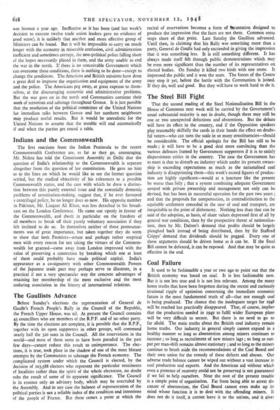The Steel Bill Fight
That the second reading of the Steel Nationalisation Bill in the House of Commons next week will be carried by the Government's usual substantial majority is not in doubt, though there may still be one or two unexpected defections and abstentions. But the debate will have its effect in the country, and if the Opposition speakers play reasonably skilfully the cards in their hands the effect on doubt- ful voters—who can turn the scale in so many constituencies—should be considerable. The official apologia for the Bill has still to be made ; it will have to be a good deal more convincing than the various defences framed by Government supporters if it is to satisfy dispassionate critics in the country. The case the Government has to meet is that to disturb an industry which under its present owner- ship is exceeding expectations as much as the nationalised coal industry is disappointing them—this week's record figures of produc- tion are highly significant—would at a juncture like the present be worse than folly ; that a system combining adequate Government control with private pwnership and management not only can be devised, but has been in successful operation for the past two years ; and that the proposals for compensation, in contradistinction to the equitable settlement conceded in the case of coal and transport, are inequitable to the point of dishonesty. Nothing less than that can be said of the adoption, as basis, of share values depressed first of all by general war conditions, then by the prospective threat of nationalisa- tion, then by Mr. Dalton's demand that profits should be _largely ploughed back instead of being distributed, then by Sir Stafford Cripps' demand that dividends should be pegged. Every one of those arguments should be driven home as it can be. If the Steel Bill cannot be defeated, it can be exposed. And that may be quite as effective in the end.


































 Previous page
Previous page